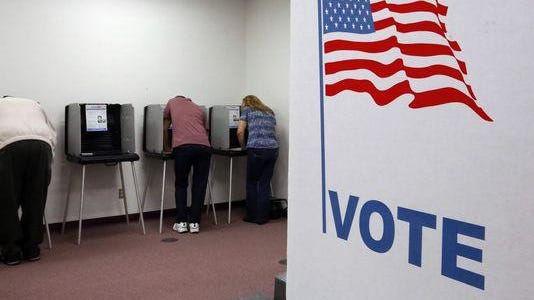Buncombe residents say they were 'disenfranchised' by change to municipal election cycle
 Mackenzie Wicker
Mackenzie Wicker
- A N.C. Senate bill in 2018 switched Asheville council elections from odd years to even ones.
- Three other Buncombe towns followed suit, bumping local elections back a year.
- Local reps in 2018 argued the move would save money and boost voter turnout.
- At a Buncombe commissioners meeting, residents said this gave officials a fifth, unelected year in office.
ASHEVILLE - More than 75,000 Buncombe County residents were denied the right to vote in 2019, according to Montreat resident Mary Standaert.
She was one of five individuals who showed up to the Buncombe County Board of Commissioners’ Jan. 21 meeting to voice concern in public comment over a change to election cycles in Montreat, Black Mountain, Biltmore Forest and Asheville that gave local officials each a fifth year in office.
The change was part of N.C. Senate Bill 813, which passed in 2018 and — at the request of Mayor Esther Manheimer — switched Asheville City Council elections from odd-numbered years to even ones, when most elections occur.
The three other Buncombe municipalities asked legislators to change their schedules as well. This pushed back 2019 elections until 2020 and 2021 elections until 2022.
New candidates were 'ready to file'
Black Mountain resident Ron Marcello said the change to even years is "all fine and dandy, except in the changeover process, our leaders decided to give themselves an extra, unapproved year in office."
"So now we have four unelected representatives in the Black Mountain council," he said. "Two of them were appointed. They were never elected in the first place and they got a free year. I don't get it. True patriots would have limited their terms to three years and then had an election."
More on local elections:
- In un-gerrymandered Buncombe, will district lines doom GOP commissioner candidates?
- Who is running for office in Asheville, Buncombe, other parts of WNC
- Commissioner elections 2020: Who is running and where?
Standaert said the 2019 elections were canceled only weeks before the July 5 candidate filing date and told the board "potential candidates were already ready to file."
Black Mountain resident Marilyn Sobanski said citizens losing their right to vote or run for office "even just once matters."
"A significant portion of the population of Buncombe County ... have been disenfranchised," she said. "Will you turn your heads away and say nothing?"
The five speakers acknowledged commissioners don't have the power to change election cycles. But they asked the board to use its voice as Buncombe's highest governing body to reach out to legislators to make sure the same thing doesn't happen in other North Carolina municipalities.
They also asked commissioners to make a formal statement calling for local officials to serve only the terms to which they were elected.

Board of Commissioners Chairman Brownie Newman told the Citizen Times on Jan. 23 he is "sympathetic to the citizens’ concerns that the terms of elected officials were extended beyond what was approved by the voters."
"There has not been time since our last meeting to gauge the overall support of commissioners for a resolution but I am personally open to considering one on this issue,” Newman said.
District 2 Commissioner Mike Fryar said he agreed with the speakers that officials getting a fifth year in office was wrong, but he said state legislators were at fault and there is little the board of commissioners can do about the issue.
"The city of Asheville has more power in the House and Senate of North Carolina than we do as county commissioners," he said.
District 2 Commissioner Amanda Edwards also noted the switch-up in election cycles was decided in Raleigh and is beyond the board's control.
"I encourage people to contact members of the local delegation to voice their concerns," she said. "Terms and elections are critical to good governance. In the future, voters should be allowed to approve or not approve term extensions through a ballot referendum."
Officials hoped to save money, boost voter turnout
In requesting state legislators switch Asheville to even-numbered election years, Manheimer said she "would like to see greater voter participation." Turnout in the 2017 City Council election was 23%.
Three of the seven council members — Brian Haynes, Sheneika Smith and Keith Young — opposed the move, saying grassroots campaigns would get lost among bigger election fights.
Black Mountain Alderman Ryan Stone — the lone dissenting vote in his town — also said he feared voters would get ballot fatigue and pay little attention to municipal competitions during years dominated by big federal and state races.
But the Black Mountain Board of Aldermen approved the change in a 3-1 vote. The majority argued that, by sharing election costs, it would eliminate most of a $12,000 expense to the town.

In Biltmore Forest, the three-member board of commissioners voted unanimously to switch local elections to even-numbered years. Town Manager Jonathan Kanipe said in an email that the board "wanted to ensure transparent, fair and cost effective elections for its citizens."
The resolution the board approved — which Kanipe provided to the Citizen Times — stated the board aimed to "create efficiency for voters during election cycles by eliminating additional and burdensome costs and creating a more streamlined election process."
Kanipe said he is not aware of any objections to the change among Biltmore Forest residents.
Montreat officials but did not immediately answer questions or provide information on the subject.
Mackenzie Wicker covers Buncombe County for the Asheville Citizen Times. You can reach her at mwicker@citizentimes.com or follow her on Twitter @MackWick.
Read more: Subscribe to the Citizen Times here.